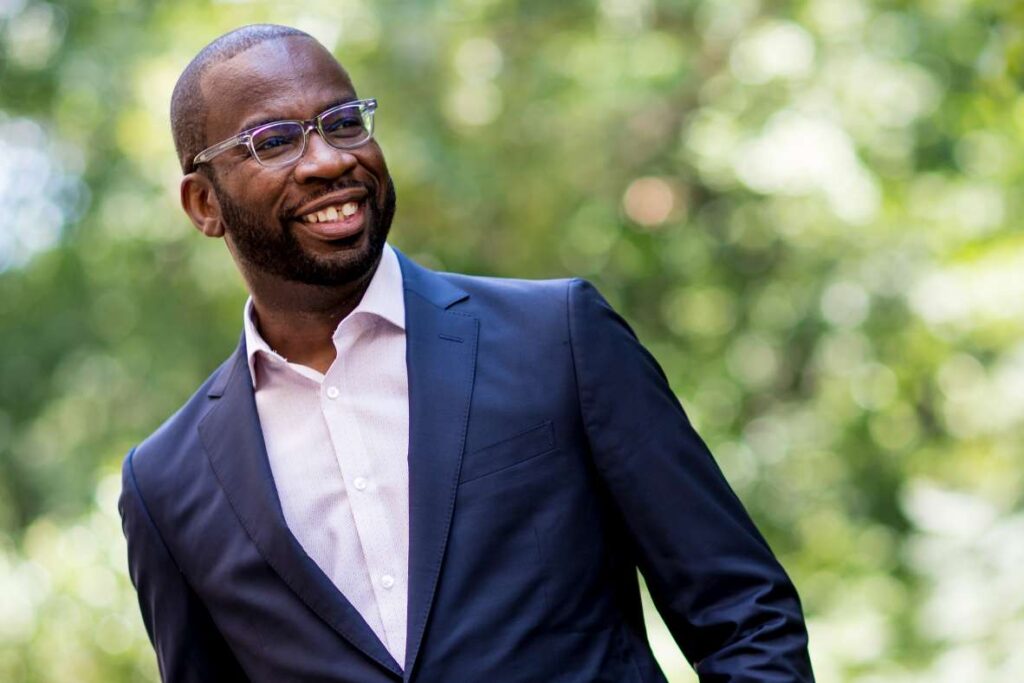What happens to an individual under 50 who suffers a stroke? That person faces the challenges of recovery compounded with the continued responsibilities of the day-to-day world.
Such was the case in December 2014 for 44-year-old Roger Brathwaite (MBA ’16), a service management consultant in the information technology field.
Brathwaite was preparing for his final Executive MBA class at Terry College’s Executive Education Center in Atlanta when he was stricken by an intracerebral hemorrhagic stroke leaving him in a coma for three weeks. He was admitted to the Shepherd Center in Atlanta, where he spent some eight months in an intensive rehabilitation program.
While he credits his family, friends, doctors, nurses, therapists and fellow patients for his recovery, he also expresses gratitude to his classmates and Terry administrators for their part in helping him on the road to healing.
And it all started with two walks he was able to take.
Three months into his recuperation, Brathwaite was invited by Argy Russell, admissions director of Terry’s Executive and Professional MBA programs, to attend a dinner celebrating the class’s upcoming graduation.
“That was the first time I was able to go to a public place and walk,” he says. “I was assisted by a physical therapist. The students were not aware I was attending. I was still sick and still recovering, but I was able to walk in and they cheered me on … I don’t think they even realized how much that meant to me.”
And while he still had assignments to complete, Brathwaite was again invited by Russell to walk with his classmates when they received their MBA degrees in May 2015.
“I had not finished the program with my class, but (Russell) allowed me to go ahead and walk, even though I had to finish the last class,” he says, adding he “officially” received his degree in August 2016.
Terry programs like the EMBA tend to foster a sense of unity among the students involved, but Brathwaite says once his classmates learned of his illness, they went above and beyond to strengthen the connection.
“Because of my stroke and what I went through, it really solidified the whole class,” he says. “We’re still friends and we’re still buddies. I know that happens in a lot of classes, but this one has a different bond because of what they did in response to my illness.”
Although Brathwaite says faith was never a topic of classroom discussion with his classmates, he adds whenever his colleagues received new information on his condition, many were compelled to pray for him.
“Every time they got updates, they had prayer calls,” he says. “It was so interesting. We’d never talked about prayer in class, so it was interesting that they turned to God and started praying together, regardless of religion and background. They came together and were prayerful about my situation. That bonded the class even more.”
“We all were shocked,” says Isaiah Banks (MBA ’15), who along with fellow classmates Toshia Battle and Greg Davis were among the first to learn of Brathwaite’s condition. “The entire class was remorseful, but you know the most touching and profound moment for me was when at least 15 to 20 of our classmates and faculty, including Argy, gathered together on a phone conference and prayed.
“I remember Toshia and Greg leading us in prayer. We all prayed and believed. Less than two months later, (he was) walking in on our finale dinner.”
A native of the U.S. Virgin Islands and the father of four sons ranging in age from 16 to 22, Brathwaite earned his undergraduate Mechanical Engineering degree in 1992 from Norfolk State and after his stroke earned a certificate from Emory University in big data/analytics.
He now has hopes of eventually finding his way back into information technology and says he wants to work in the health care industry, but adds going into real estate or starting his own business are other options he’s considering.
Brathwaite meets regularly with a group of young stroke survivors in Atlanta and says nearly all have the same drive.
“Strokes are now affecting younger people like myself, and we have different things to be concerned about,” he says. “We are concerned about getting back to work, concerned about giving back to our community, concerned about having our regular lives.”
And he’s well aware of the challenges he’ll face — not just in business but also in life — as he continues his slow-but-sure recovery.
“Usually folks have strokes later in life and are more concerned with having an easy way into transitioning into relaxing,” says Brathwaite, now 47. “For me, I’ve got almost 50 more years to live!”

